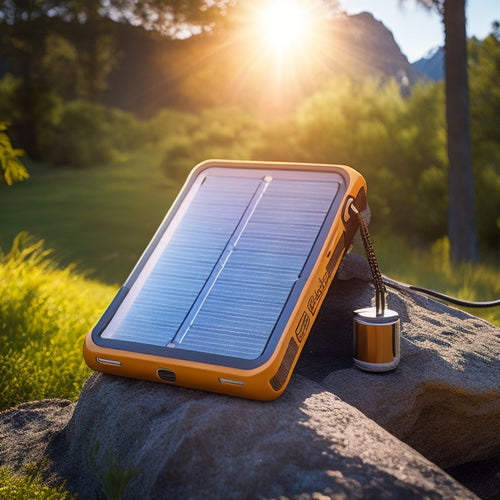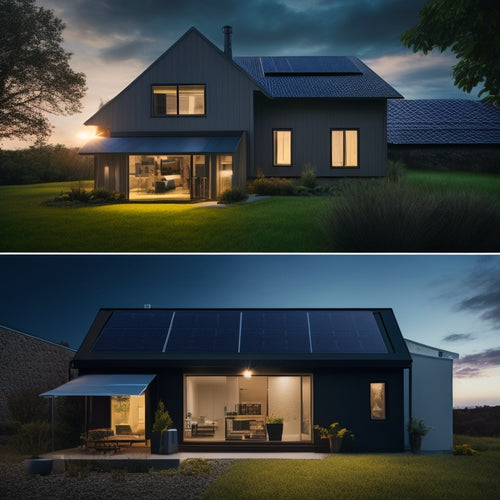
Small Solar Battery System
Share
You're considering a small solar battery system to power your daily life, and with this technology, you can guarantee operational continuity during power outages, achieve energy self-sufficiency, and reduce your reliance on the grid. By integrating renewable energy sources, you'll minimize disruption to daily life, control your energy needs, and store excess energy for night use. With advanced technology, you can maximize energy output even in adverse weather conditions. As you investigate the benefits of small solar battery systems, you'll uncover how to optimize energy consumption patterns, maintenance, and performance to achieve a sustainable energy solution that's customized to your needs.
The Essentials
- Small solar battery systems provide backup power during outages, ensuring operational continuity and energy self-sufficiency.
- They reduce carbon emissions and reliance on fossil fuels, promoting a sustainable future with renewable energy sources.
- Deep cycle battery technology and proper maintenance are crucial for system reliability and longevity, with well-maintained batteries lasting up to 10 years or more.
- Analyzing energy consumption patterns and daily power requirements helps determine the right system size and optimize energy storage capacity.
- Higher round-trip efficiency rates in small solar battery systems enhance energy storage capacity and minimize energy losses during charging and discharging.
Grid Independence Guaranteed Daily
You can power through outages and interruptions with a small solar battery system, ensuring your home remains operational when the grid goes down.
By integrating a battery storage system into your solar setup, you'll release the full potential of renewable energy and create a more sustainable, dependable, and cost-effective power solution Energy Storage Solutions.
This means you'll have energy self-sufficiency, relying on your own generating capacity to meet your needs.
Power Through Outages
With a small solar battery system, it's reassuring to know that power outages won't disrupt daily life. You'll have backup power when you need it most, guaranteeing outage preparedness and energy resilience. Emergency lighting will stay on, and your energy security will remain intact.
This is especially important for homeowners who want to maximize their renewable energy storage Renewable Energy Storage and reduce their reliance on the grid. By investing in a small solar battery system, you're taking an essential step towards energy independence.
Your small solar battery system provides power reliability, even when the grid fails. By utilizing renewable backup energy, you're no longer at the mercy of the grid. Plus, system scalability means your system can grow with your energy needs.
Regular battery maintenance is vital to guarantee your system operates at peak performance. Energy monitoring allows you to track your energy production and consumption, making adjustments as needed.
With a small solar battery system, you'll enjoy peace of mind knowing you're prepared for power outages, anytime.
Energy Self-Sufficiency
Energy autonomy is achieved through a small solar battery system, guaranteeing daily grid independence. You're no longer bound to the whims of the utility company, and you're not at the mercy of power outages.
With a small solar battery system, you're in control of your energy needs. By incorporating a reliable solar panel battery into your system, you can store excess energy generated during the day for use at night or during power outages, and increase your overall return on investment by maximizing energy independence.
This advanced technology guarantees maximum energy output, even on cloudy days. You'll reduce your reliance on the grid and lower your energy bills. Imagine having the freedom to power your home, no matter what's happening outside.
Your small solar battery system is designed to provide a consistent flow of energy. It stores excess energy generated during the day for use at night or during power outages.
You'll have peace of mind knowing you're protected from unexpected disruptions. By investing in a small solar battery system, you're taking an essential step towards energy self-sufficiency. You're breaking free from the grid and embracing a cleaner, more sustainable future.
Lower Carbon Footprint Guaranteed
You'll markedly reduce your carbon emission by switching to a small solar battery system, which is an eco-friendly energy solution that utilizes renewable energy from the sun.
With the help of residential solar energy systems, you can reduce your energy bills and carbon footprint.
This change will lower your reliance on fossil fuels, a major contributor to greenhouse gas emissions.
Carbon Emission Reduction
Utilizing renewable energy sources, such as a small solar battery system, is essential for reducing your carbon footprint and mitigating climate change. By adopting carbon offset strategies, you can counterbalance your greenhouse gas emissions and contribute to a cleaner environment. Additionally, renewable energy incentives, such as tax credits and rebates, can help offset the initial investment costs of installing a small solar battery system.
| Carbon Offset Strategy | Emission Reduction | Cost Savings |
|---|---|---|
| Solar Power Generation | 1 ton CO2/month | $50/month |
| Energy Efficiency Measures | 0.5 ton CO2/month | $20/month |
| Carbon Sequestration | 2 tons CO2/month | $100/month |
| Green Energy Certificates | 1.5 tons CO2/month | $75/month |
Eco-Friendly Energy Solution
Implementing a small solar battery system is a notable step towards reducing your reliance on fossil fuels and decreasing your carbon footprint. By integrating solar panels into your energy setup, you'll generate clean power and considerably lower your energy bills.
As a bonus, you'll also benefit from renewable energy incentives offered by the government, which can help offset the initial investment costs.
With a small solar battery system, you'll have more control over your energy consumption and production. You can store excess energy generated during the day for use during the night or on cloudy days, reducing your reliance on the grid.
This means you'll be less affected by power outages and rate hikes. Furthermore, solar energy is a clean and sustainable source, producing no emissions or pollution, making it an eco-friendly solution for your energy needs.
Deep Cycle Battery Technology
You're likely wondering what makes deep cycle batteries suitable for your small solar battery system. The answer lies in their ability to withstand frequent charge and discharge cycles, which affects their life expectancy.
Deep cycle batteries are designed to provide reliable power storage for off-grid homes and renewable energy systems, making them an ideal choice for small solar battery systems.
The depth of these cycles also matters, as it directly impacts the battery's overall performance and lifespan.
Battery Life Expectancy
Reliability is a vital factor in the performance of a small solar battery system, and it begins with the battery life expectancy of its deep cycle battery technology.
You need to make certain your deep cycle battery is designed to last, and that means understanding how to extend its lifespan. Proper battery maintenance tips are important, such as keeping the battery terminals clean, checking electrolyte levels, and avoiding deep discharging.
Ideal charging techniques are also essential, like avoiding overcharging and using a smart charge controller to regulate the flow of energy.
By following these guidelines, you can expect your deep cycle battery to last up to 10 years or more, depending on the quality of the battery and your charging habits.
With a well-maintained battery, you'll enjoy a reliable and efficient small solar battery system that provides you with the freedom and independence you desire.
Cycle Depth Matters
Every deep cycle battery has a limited number of charge cycles it can handle before its capacity starts to degrade. The cycle depth, or how deeply you discharge your battery, greatly impacts its lifespan. You'll want to understand how to optimize your battery's cycle depth to guarantee you get the most out of your small solar battery system.
| Cycle Depth | Recommended Usage | Battery Life |
|---|---|---|
| 50% | Daily usage, moderate loads | 5-7 years |
| 80% | Occasional heavy loads, backup power | 3-5 years |
| 100% | Avoid, may cause premature wear | <3 years |
To maximize your battery's lifespan, follow these battery maintenance tips: avoid deep discharging, keep your battery charged between 50% to 80% when not in use, and monitor your battery's state of charge regularly. Additionally, verify your solar panel compatibility by selecting a battery that matches your solar panel's voltage and capacity. By doing so, you'll be able to utilize the full potential of your small solar battery system and enjoy the freedom that comes with renewable energy.
Count Your Energy Needs
You'll need to understand your energy consumption patterns to determine the right size of your solar battery system.
Start by identifying your daily power requirements, including the total watt-hours consumed by your appliances and devices.
When it comes to renewable energy solutions, considering your energy needs is essential to maximize energy harvesting and reduce blackouts.
Energy Consumption Patterns
By virtue of their unique energy requirements, small solar battery systems necessitate a thorough understanding of energy consumption patterns. You need to analyze your energy usage to determine how much power you require from your system. This involves identifying your consumption trends, including the time of day you use the most energy and the devices that consume the most power.
To do this, start by tracking your energy usage over a typical week or month. Note the times when you use the most energy-intensive appliances, such as refrigerators, air conditioners, or washing machines.
You should also consider the number of devices you have and their individual energy requirements. For instance, if you have multiple laptops, smartphones, and LED lights, you'll need to factor in their collective energy consumption.
Daily Power Requirements
Having analyzed your energy consumption patterns, you're now ready to calculate your daily power requirements. This step is essential in determining the size of your solar energy system and battery capacity.
To do this, you'll need to add up the total watt-hours (Wh) of energy required by your appliances and devices per day.
Start by listing all the devices you want to power with your solar energy system, including lights, laptops, refrigerators, and any other vital appliances. Next, estimate the average daily usage time for each device in hours.
Multiply the wattage of each device by its usage time to get the total watt-hours per day.
Add up the total watt-hours for all devices to get your daily power requirement. For example, if you need 200 Wh for lights, 400 Wh for laptops, and 800 Wh for refrigeration, your total daily power requirement would be 1,400 Wh.
This figure will help you determine the required battery capacity and solar panel size for your system, ensuring you have a reliable and efficient source of energy.
Higher Round-Trip Efficiency Rate
You're looking for a small solar battery system that can maximize its energy storage capacity.
To achieve this, you need a system with a higher round-trip efficiency rate, which is influenced by the battery's efficient charge cycles.
Efficient Charge Cycles
This small solar battery system's efficient charge cycles are critical to its overall performance, as they directly impact the round-trip efficiency rate. You need to guarantee that your system's charge management is optimized to minimize energy losses during charging and discharging. This is where the system's battery compatibility comes into play.
When choosing a battery, you should consider its chemistry, capacity, and cycle life. Lithium-ion batteries, for instance, are known for their high round-trip efficiency and long cycle life. They're an excellent choice for small solar battery systems.
The charge cycle's efficiency also depends on the system's ability to manage charging and discharging rates. A well-designed system will prevent overcharging, which can reduce the battery's lifespan.
You should also consider the system's ability to balance charging and discharging rates to minimize energy losses. By optimizing your system's charge cycles, you'll be able to maximize its overall performance and enjoy a reliable source of renewable energy.
Frequently Asked Questions
Can I Use a Small Solar Battery System for My RV or Boat?
You can utilize the sun's power for your RV or boat, but consider the type of solar battery you need, as deep-cycle or lithium-ion batteries suit mobile applications, and factor in installation costs, which vary depending on system size and complexity.
How Long Does It Take to Install a Small Solar Battery System?
When you decide to go off-grid, you'll wonder how long the installation process takes. Typically, you'll spend around 2-5 hours on the installation timeline, depending on the system's complexity and your level of skill.
Are Small Solar Battery Systems Eligible for Government Incentives?
You're wondering if your eco-friendly investment will pay off - literally! Yes, you're eligible for government incentives, as long as your system meets the eligibility criteria set by incentive programs, providing a sweet return on your sustainable investment.
Can I Monitor My Small Solar Battery System Remotely?
You can monitor your system remotely, enjoying freedom from on-site checks, through solar battery apps that provide real-time data, enabling you to track performance, receive alerts, and optimize energy usage from the convenience of your mobile device.
Is a Small Solar Battery System Noisy During Operation?
Relax, you won't be awakened by a jackhammer-esque racket; most solar systems operate silently, thanks to clever solar inverter noise reduction and battery cooling systems, ensuring your off-grid freedom isn't disrupted by a cacophony of annoyances.
Final Thoughts
As you utilize the power of a small solar battery system, you're not just reducing your carbon footprint - you're taking control of your energy needs. It's like having a reliable copilot, guiding you through the ups and downs of grid outages and rate hikes. With a round-trip efficiency rate of up to 95%, your system is like a well-oiled machine, storing and releasing energy as needed. By counting your energy needs and investing in deep cycle battery technology, you'll be driving towards a more sustainable future - one sunny day at a time.
Related Posts
-

Why Outdoor Solar Lighting Systems Are Sustainable
Outdoor solar lighting systems are sustainable because they utilize renewable energy, drastically reducing your carbo...
-

Fastest Solar Chargers for Emergency Power
When choosing the fastest solar chargers for emergency power, you need to focus on features like rapid charging capab...
-

Cost of Home Solar Battery
You're looking to invest in a home solar battery to reduce your grid reliance, but you're curious about the cost. The...


